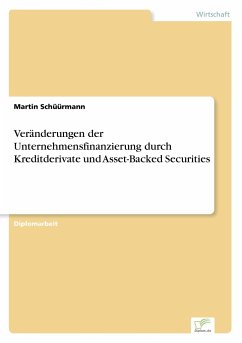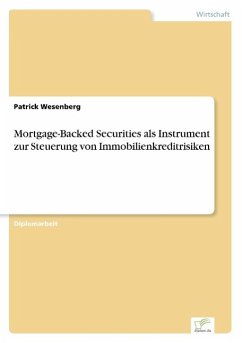Inhaltsangabe:Summary: In order to ensure that the mortgage market remains buoyant, lenders require constant access to sufficient funds. Traditionally, mortgage lenders rely on retail deposits, mortgage covered bonds or dedicated savings to provide this source of funding. However, those providers who do not have the luxury of an established and reliable retail deposit base, or high credit rating necessary for cheap money market credit, are forced to think of alternatives. Securitization of originated mortgage loans can provide the answer. Financial institutions that originate loans are able to turn their loans into marketable securities through a process known as securitization. The originators of the loans are commonly referred to as the issuers of asset-backed securities (ABS). ABS constitute a relatively new but fast growing segment of the debt markets in Europe. The combination of a number of legal and economic factors has provided a favorable climate for securitization in Europe, especially in the United Kingdom (UK) and in its country of origin, the United States (US). In turn, these countries have experienced considerable growth in securitization volumes over the past years. In contrast, due to a weak economy and an unfavorable legal, tax and regulatory environment the German securitization market was not able to develop in much the same way. However, the German economy has started to recover in the current year and is forecasted to continue growing in 2007. This economic growth will in turn drive the domestic mortgage demand. In addition, based on the state and structure of the German mortgage market it is becoming increasingly attractive for foreign investors. Thus, both the economic recovery and an increased mortgage demand will drive the funding requirements of German banks. Moreover, the significance of securitization as an alternative refinancing instrument for residential mortgages is likely to grow, not least because the elimination of the legal, tax and regulatory hurdles has enhanced the attractiveness of true-sale securitization in Germany. The title of the thesis is called, Mortgage Backed Securities - A New Source of Financing Retail Mortgages for German Banks. As raising finance is elementary to the growth and profitability of banks, the hypothesis of the thesis inevitably boils down to the question, whether the application of mortgage backed securities (MBS) increases the ability of German banks to raise finance for [¿]
Hinweis: Dieser Artikel kann nur an eine deutsche Lieferadresse ausgeliefert werden.
Hinweis: Dieser Artikel kann nur an eine deutsche Lieferadresse ausgeliefert werden.








